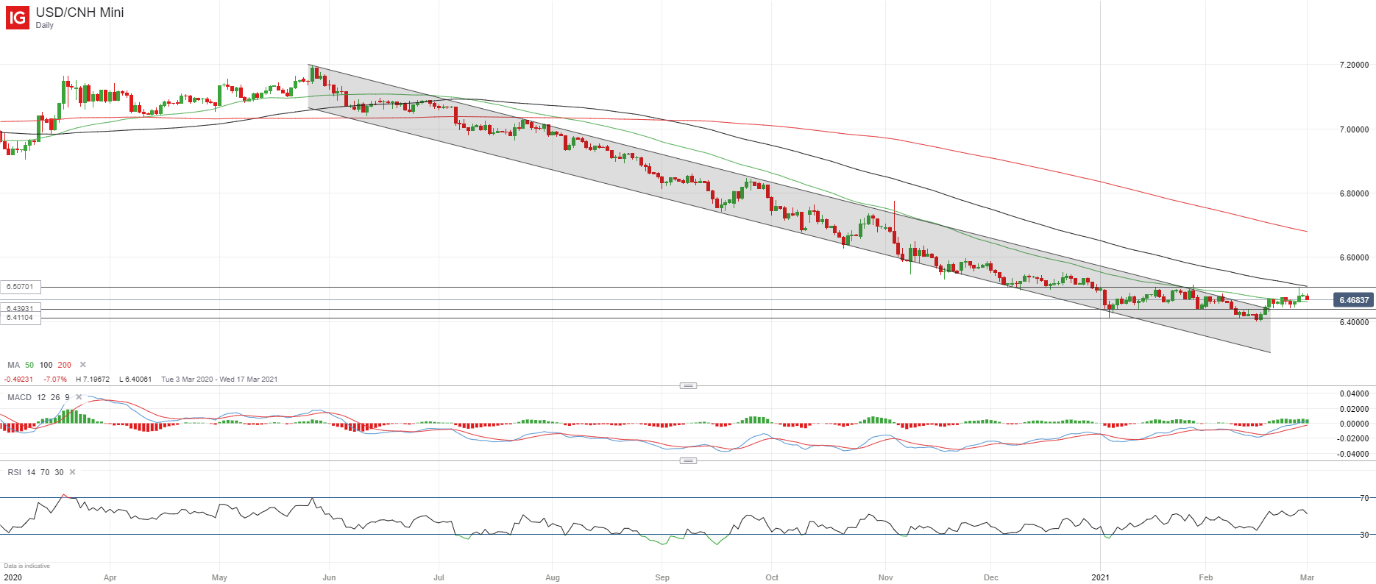China PMIs slow with Lunar New Year effect
China’s February PMIs disappointed across both manufacturing and services readings with the Lunar New Year effect in play. Rising input prices is worth watching as USD/CNH maintain the sideways action.

February PMIs suggest China still in the sweet spot
The official NBS PMIs, alongside the Caixin manufacturing PMIs, had disappointed in the latest February reading, though having all sustained in expansion territory. Seasonal decline with the Lunar New Year holidays had largely been blamed for the latest slide seeing both the official and Caixin manufacturing readings slipping to the lowest reading seen since May 2020. Notably, demand was seen softening into February as per the new orders and new export orders counters but had largely been viewed to be a result of the Chinese New Year effects.
Over and above the slowdown in both demand and output for the month, the employment gauge had notably also declined with more cautious approach towards staffing levels reported to have sustained according to Caixin’s findings. This again supports more gradual removal of accommodation by the authorities and bodes well for the Chinese market. At the same time, despite the blip that we have seen with the headline number, driven by the holiday effects, firms continue to a positive view on outlook which suggests that things continue to look up for the Chinese economy.
The only caveat here would be the effect of rising commodity prices and the corresponding lift in input costs noted that may dent the performance for smaller enterprises and broad demand going forward, one worth the scrutiny here.

USD/CNH taking a breather from the downtrend
Rising US Treasury yields had lent a hand to the greenback following months of USD/Asians declines. Specifically for USD/CNH, the pair had seen strong support coming through at the 6.40 level that had led to a deviation from the multi-month downtrend channel. Although prices had attempted to trade above its 50-day moving average, signalling upward momentum picking up, it had met resistance towards the 6.50 level. The conflicting forces of rising UST yields and positive fundamentals for China, as illustrated through the latest PMIs updates, could keep the pair rangebound between the 6.40-6.50 level in the near-term awaiting fresh triggers.

This information has been prepared by IG, a trading name of IG Markets Limited. In addition to the disclaimer below, the material on this page does not contain a record of our trading prices, or an offer of, or solicitation for, a transaction in any financial instrument. IG accepts no responsibility for any use that may be made of these comments and for any consequences that result. No representation or warranty is given as to the accuracy or completeness of this information. Consequently any person acting on it does so entirely at their own risk. Any research provided does not have regard to the specific investment objectives, financial situation and needs of any specific person who may receive it. It has not been prepared in accordance with legal requirements designed to promote the independence of investment research and as such is considered to be a marketing communication. Although we are not specifically constrained from dealing ahead of our recommendations we do not seek to take advantage of them before they are provided to our clients.

Start trading forex today
Trade the largest and most volatile financial market in the world.
- Spreads start at just 0.6 points on EUR/USD
- Analyse market movements with our essential selection of charts
- Speculate from a range of platforms, including on mobile
Live prices on most popular markets
- Forex
- Shares
- Indices

